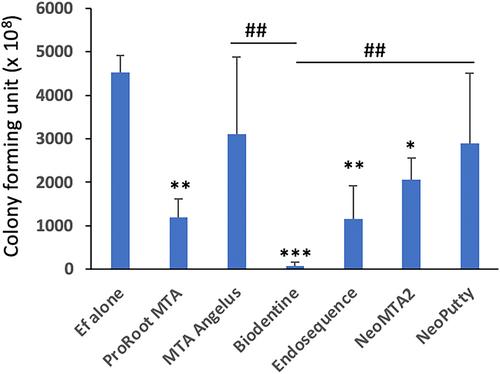Different pulp capping materials have different origins and compositions, require different preparations, and may vary in their bioactive properties.
The purpose of this study was to evaluate the antibacterial activity, biocompatibility, and mineralization-inducing potential of calcium silicate-based pulp capping materials.
Six contemporary calcium silicate-based cements, ProRoot MTA, MTA Angelus, Biodentine, EndoSequence, NeoMTA 2, and NeoPutty, were evaluated. The antibacterial effects of these materials against Streptococcus mutans UA159 and Enterococcus faecalis ATCC 29212 were determined by the agar diffusion assay and the direct culture test. The biocompatibility and mineralization-inducing potential of these materials in preodontoblastic 17IIA11 cells were evaluated by the MTT assay and by Alizarin Red S staining, respectively.
In agar diffusion test, only Biodentine showed distinct antibacterial effects against S. mutans. All the tested materials, however, showed antibacterial effects against S. mutans and E. faecalis in the direct culture test, with Biodentine showing the strongest growth inhibition against both S. mutans and E. faecalis. All the tested materials showed acceptable biocompatibility and mineralization-supporting potential in our experimental conditions. In summary, ProRoot MTA, MTA Angelus, Biodentine, EndoSequence, NeoMTA 2, and NeoPutty demonstrated acceptable in vitro antimicrobial, biocompatible, and mineralization-supporting properties.


